Radiant Floor Heating
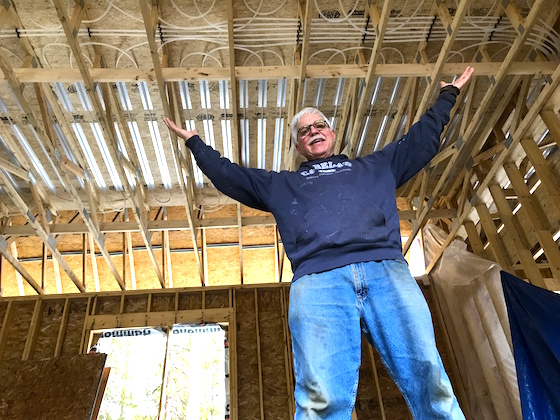
Radiant Floor Heating | Here's a peek at some of the 6,000 feet of Uponor hePex that's going to keep the floors in my daughter's new house toasty warm. The PEX tubing snaps into aluminum heat-transfer plates. You bet I'm happy as this was a complex job that we completed using the three Ds: diligence, discipline, and determination. (C) 2021 Tim Carter
DEAR TIM: I have a unique opportunity to convert to radiant floor heating in my home. A complete renovation is in progress, and I'm convinced radiant floor heat will be the best for me. Is installing radiant floor heat a task that the average homeowner can do successfully? What do I need to know to ensure my radiant floor heat system is installed correctly? Is one radiant floor heater better than the other? Victoria B., Holderness, NH
DEAR VICTORIA: Radiant floor heating is heavenly. If you've never had it before, you'll not sacrifice it in any future homes. The house I'm living in now is the first one I've ever had that has radiant floor heat. I've known for years that it's perhaps the most comfortable but never experiencing it, I couldn't stand witness. Well, now I can. I'm smitten with it.
CLICK HERE to get FREE BIDS from local contractors who will install radiant floor heating.
Can Radiant Heating Be in Concrete or Under Wood?
Radiant heating can be installed in concrete or wood floors. You can use hot water or electric-resistance heating pads.
Hot water radiant floor heat is an amazing system, whether the flooring system is wood or masonry. The floor itself, once heated, sends out low-level infrared rays through the air to heat your body and any other solid object in the room.
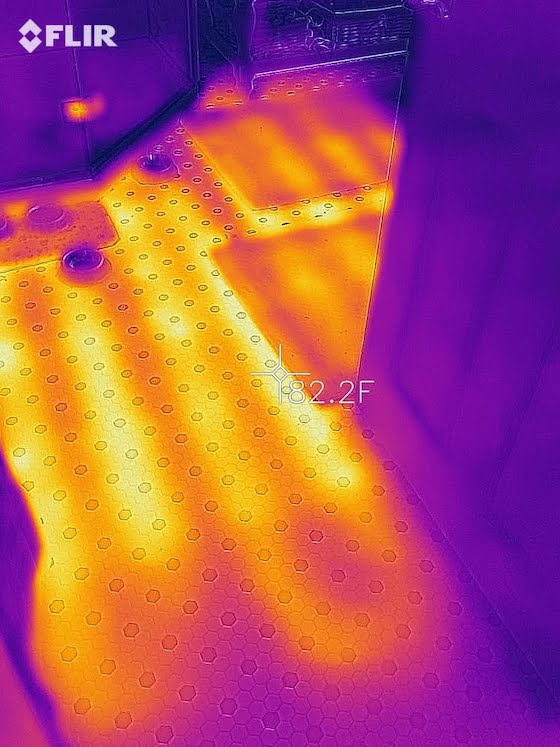
This is an infrared photo showing radiant heat in my bathroom floor. The aluminum Uponor heat transfer plates and the Uponor hePEX tubing work together to keep my feet, and those of She Who Must Be Obeyed, toasty warm!
No heat is wasted in the air. Forced-air heating systems don't really do that. The water vapor in the air is warmed, and as these microscopic molecules are blown through the air they inefficiently transmit their warmth to you as the warm air hits you. It's just not the same feeling.
Is it Easy to Install Radiant Floor Heat?
No, it's not easy to install radiant floor heat. You may rise to the challenge if you're a DIYr, but the odds are you might make a costly design error or two.
CLICK HERE to get FREE BIDS from local contractors who will install radiant floor heating.
You can forget about installing radiant floor heat yourself. It's an extremely complex task requiring enormous skill and talent. You want a seasoned installer that can prove to you he's installed countless systems. The calculations, flow rates, Btu heat-loss calculations, and engineering required to get a residential system to work flawlessly are difficult. Installing the actual equipment and piping is another skill set entirely. Focus your energies on interviewing several pros, talk to past customers and decide which pro will do the best job for you. Going with the low bid in this situation could be an enormous mistake.
How Does the Floor get Warm?
Radiant floor heat starts its life in a boiler. Modern radiant-floor heaters, or boilers, are highly efficient, and they are amazingly compact. I recommend getting a combi boiler. This provides the heat for the home and gives you unlimited hot domestic water too.
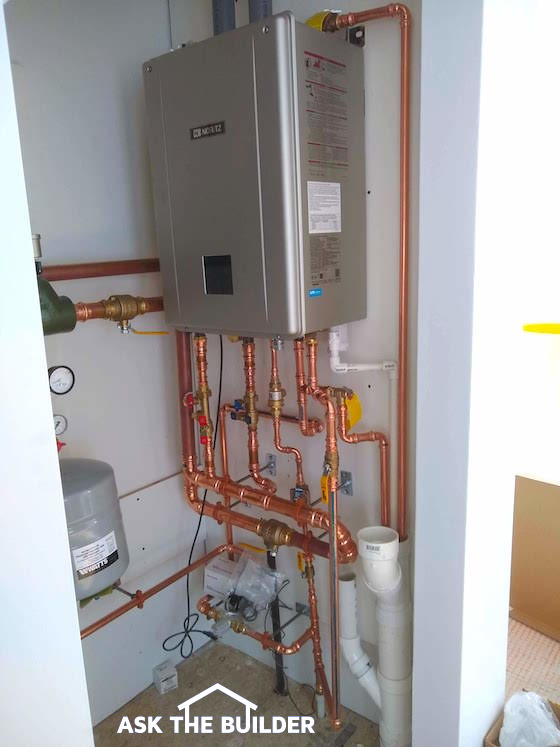
This is a Noritz combi boiler in my daughter's home. It's about the size of a piece of luggage! (C) 2021 Tim Carter
You will be stunned at how small yours will probably be. Don't restrict your budget here. You want a superb boiler, so ask the different installers who makes the best one and why they feel that way. Invest time in searching for reviews on the Internet.
How Does the Boiler Heat the Floors?
Water is heated in the boiler and sent into a piping system that recirculates this water through any number of interconnected loops. One of the magical things you can have with radiant floor heating are individual zones.
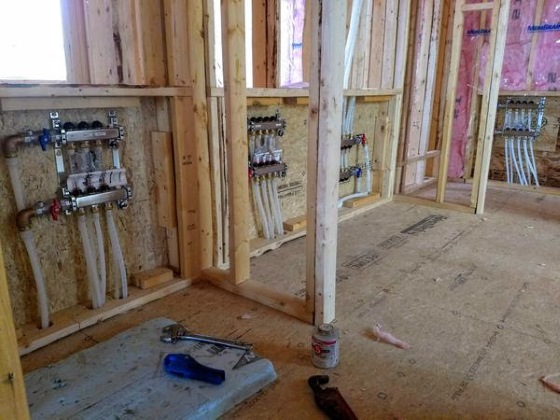
Here are four different zones. A manifold sends water to the heating pipes in each zone.
My current house has seven separate zones, each one controlled by its own thermostat. I can control the heat level in each zone. A zone typically is a grouping of two or three rooms that are almost always connected to one another. For example, in my basement, a bedroom, large closet and a bathroom are on one zone. The other four rooms in the basement are on another zone.
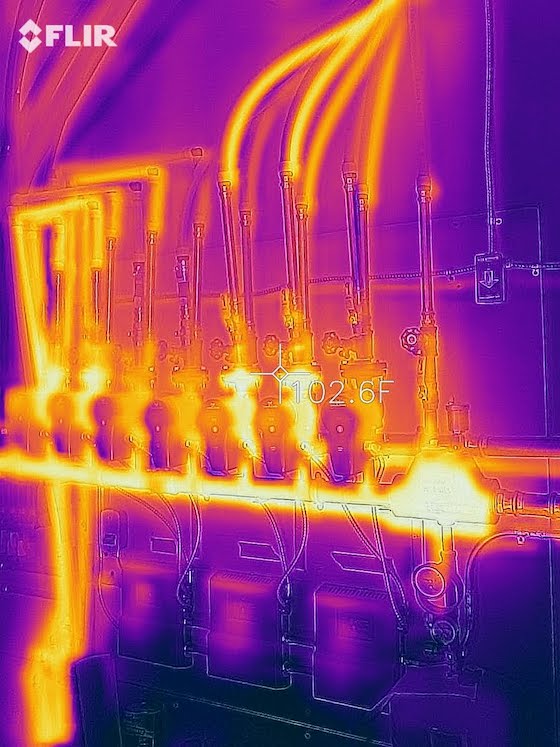
Infrared Photos | These are the heating supply pipes in my daughter's new home. Can you tell how many zones of the seven are calling for heat? Can you see which are the outgoing supply pipes with hotter water than the return pipes coming back to get reheated? Can you see why having one of these infrared cameras is such a good idea?
Do You Need Pumps to Move the Hot Water?
The water is pumped to each zone by separate recirculating pumps. These workhorses are one of the few moving parts in a common radiant-floor-heating system. High-quality recirculating water pumps can last many years.
What Should I Ask the Installers?
To make sure your radiant-floor-heating system is installed correctly, you need to ask lots of questions as you interview installers. Talk to them about the necessary calculations as to how they know there will be enough heat on the coldest possible winter days. Discuss which plastic radiant-heat piping will provide years of service. Ask about how the piping will be protected so it will never get punctured. Inquire about insulating concrete slabs so you don't bleed heat to the outdoors. Many radiant-floor-heat boiler manufacturers have some good tips as well on their websites.
CLICK HERE to get FREE BIDS from local contractors who will install radiant floor heating.
Make sure that all the promises made by your installer are put in writing in the contract. Take many photos of each step of the installation, especially those parts of the piping that will be covered and never seen again. Inspect the work to the best of your ability as you take the photos. Make sure your installer gets a permit and that the inspector gives the job her/his seal of approval.
How Warm Are the Floors?
One of the superb characteristics of radiant floor heating is the warmth of the floor. You can lay on the floor and be amazingly comfortable. Other floors are cold or uncomfortable. A floor that's heated is a dream to walk on with bare feet or just in socks. You'll not believe it until you try it.
Does Concrete Work Well?
Concrete slabs that contain the radiant-floor-heat piping become massive radiators. Once the concrete gets heated, the thermal mass radiates the heat into the room for hours. You can get the slab up to temperature and then turn back the thermostat. I've actually had my basement floor radiate bone-warming heat for up to 12 hours after the thermostat was turned back.
Column 756